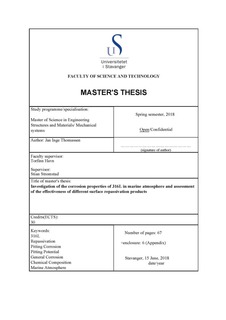Investigation of the corrosion properties of 316L in marine atmosphere and assessment of the effectiveness of different surface repassivation products
Master thesis
Permanent lenke
http://hdl.handle.net/11250/2562594Utgivelsesdato
2018Metadata
Vis full innførselSamlinger
Sammendrag
The major purpose of this thesis was to investigate and assess what effect of repassivation product has on corrosion resistance of 316L in marine atmosphere. Additionally, compare the chemical composition with the certificate.
Several methods was performed to break down the passive layer, where the most successful method was used further to achieve general corrosion, after being exposed for simulated marine atmosphere. Visual inspection was observed before and after repassivation, and electrochemical test was done to find the pitting- and repassivation potential. The electrochemical test was performed according to standard ASTM G61-86 with a few adjustments. Similarly, the chemical composition was compared with the certificate.
General corrosion was obtained after being exposed for simulated marine atmosphere, before it was exposed for a rotary steel brush with hard braided threads equipped by a grinder to break down the passive layer. The visual inspection and ASTM G61-86 test showed Valhall UltraGel as the best environmentally friendly product and Avesta, with pickling, as the best product used with waste water treatment system. Chemical analysis showed that the chemical composition match with the certificate.
Beskrivelse
Master's thesis in Mechanical engineering
